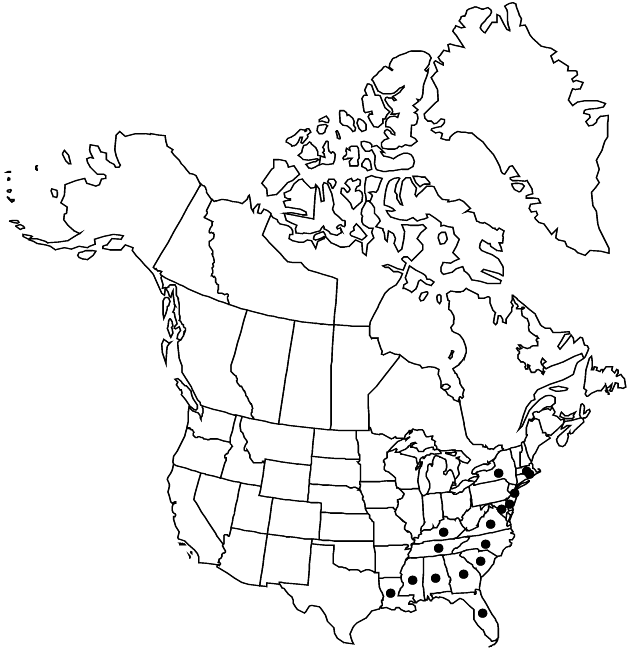Difference between revisions of "Symphyotrichum concolor"
Phytologia 77: 278. 1995.
FNA>Volume Importer |
imported>Volume Importer |
||
| Line 8: | Line 8: | ||
}} | }} | ||
|common_names=Eastern silvery aster | |common_names=Eastern silvery aster | ||
| + | |special_status={{Treatment/ID/Special_status | ||
| + | |code=F | ||
| + | |label=Illustrated | ||
| + | }}{{Treatment/ID/Special_status | ||
| + | |code=E | ||
| + | |label=Endemic | ||
| + | }} | ||
|basionyms={{Treatment/ID/Basionym | |basionyms={{Treatment/ID/Basionym | ||
|name=Aster concolor | |name=Aster concolor | ||
| Line 34: | Line 41: | ||
-->{{Treatment/Body | -->{{Treatment/Body | ||
| − | |distribution= | + | |distribution=Ala.;Del.;Fla.;Ga.;Ky.;La.;Mass.;Md.;Miss.;N.C.;N.J.;N.Y.;R.I.;S.C.;Tenn.;Va. |
|discussion=<p>Varieties 2 (2 in the flora).</p> | |discussion=<p>Varieties 2 (2 in the flora).</p> | ||
|tables= | |tables= | ||
| Line 64: | Line 71: | ||
|basionyms=Aster concolor | |basionyms=Aster concolor | ||
|family=Asteraceae | |family=Asteraceae | ||
| − | |distribution= | + | |distribution=Ala.;Del.;Fla.;Ga.;Ky.;La.;Mass.;Md.;Miss.;N.C.;N.J.;N.Y.;R.I.;S.C.;Tenn.;Va. |
|reference=None | |reference=None | ||
|publication title=Phytologia | |publication title=Phytologia | ||
|publication year=1995 | |publication year=1995 | ||
| − | |special status= | + | |special status=Illustrated;Endemic |
| − | |source xml=https:// | + | |source xml=https://bibilujan@bitbucket.org/aafc-mbb/fna-data-curation.git/src/bb6b7e3a7de7d3b7888a1ad48c7fd8f5c722d8d6/coarse_grained_fna_xml/V19-20-21/V20_1104.xml |
|tribe=Asteraceae tribe Astereae | |tribe=Asteraceae tribe Astereae | ||
|genus=Symphyotrichum | |genus=Symphyotrichum | ||
Revision as of 20:43, 27 May 2020
Perennials, 30–80 cm, cespitose; with cormoid, woody caudices. Stems 1–10+, ascending to erect (light to dark brown), glabrous or densely canescent distally. Leaves (green to graysih) soft to firm; basal withering by flowering, sessile, blades (1–3-nerved) elliptic-lanceolate, 10–43 × 5–15 mm, bases attenuate, margins usually entire, rarely remotely serrate, piloso-ciliate, apices acute to obtuse, faces silvery silky-pilose to sparsely pilose; proximal cauline withering by flowering, sessile, blades oblanceolate, 20–35 × 5–15 mm, bases rounded, subclasping, margins entire, scabrous to silky-pilose, apices acute to obtuse, cuspidate mucronate, faces ± densely silky; distal sessile, blades usually oblong to lanceolate, rarely ovate, 9–15 × 1.8–5 mm, reduced distally, bases cuneate, margins entire, apices acute, mucronate, faces ± densely silky or sparsely strigose, sometimes glabrate (var. devestitum). Heads in narrow, paniculiform (virgate) arrays (1–3(–5) per branch). Peduncles densely hairy, bracts becoming linear, grading into phyllaries. Involucres campanulate to narrowly campanulate, 5–7 mm. Phyllaries in 3–5 series, appressed, lanceolate-oblong, strongly unequal, bases (tan) ± indurate, margins scarious proximally, green distally, green zones restricted to apex, obscured by hair, apices usually acute, sometimes acuminate, usually mucronate, sometimes subspinulose, faces ± densely silky. Ray florets 8–12; corollas rose-purple, rarely white, laminae 4–9 × 1–1.5 mm. Disc florets (9–)11–17(–21); corollas pink turning purple, 4.5–6 mm, tubes shorter than narrowly funnelform throats (thinly puberulent), lobes triangular, 0.4–0.7 mm. Cypselae obovoid, not compressed, 2.5–3.5 mm, 7–10-nerved, faces densely strigose; pappi tan, (3.5–)4–6 mm.
Distribution

Ala., Del., Fla., Ga., Ky., La., Mass., Md., Miss., N.C., N.J., N.Y., R.I., S.C., Tenn., Va.
Discussion
Varieties 2 (2 in the flora).
Selected References
None.
Key
| 1 | Distal cauline leaves and phyllaries moderately to densely silky; e United States | Symphyotrichum concolor var. concolor |
| 1 | Distal cauline leaves and phyllaries glabrous or sparsely hispido-pilose; panhandle Florida | Symphyotrichum concolor var. devestitum |